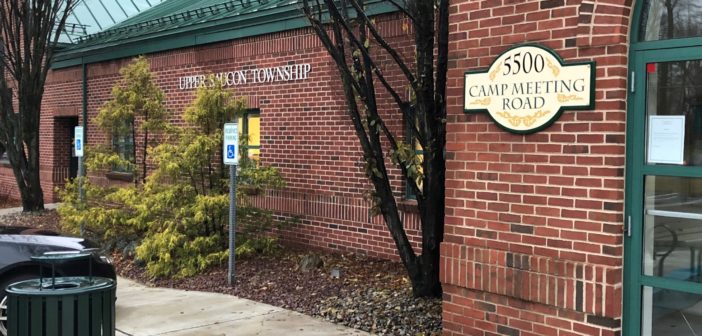When Pennsylvania Gov. Tom Wolf implemented a stay-at-home order for the state in response to the coronavirus, Justin Rupert, the general manager at Kome Japanese Cuisine in Upper Saucon Township, said everyone at the restaurant was laid off.
All 65 employees were instructed to file for unemployment.
The restaurant closed.
“I’ve just been trying to keep in touch with the staff and see how people are doing,” Rupert said. “People are anxious to get back to work. Some have expressed frustration with unemployment or not getting their stimulus check. It’s been really tough on some folks.”
Fortunately, Rupert said, Kome was only closed for about a week following the stay-at-home order. After seeing so many other restaurants open for takeout or delivery, Rupert decided Kome could do the same, and he was able to bring back six to eight employees from different departments to run operations — still less than one-sixth of the restaurant’s typical workforce.
Rupert said Kome — a popular hibachi restaurant located in the Promenade Shops — is earning only about 30 percent of its typical revenue but has seen a steady increase in its curbside delivery since the restaurant reopened for takeout.
“Everyone’s been very patient, and we’re very blessed to have such a good customer base supporting us,” Rupert said. “One of our regulars even purchased a gift card for $3,000 just to show her support.”
Kome is just one piece of Upper Saucon Township — population of 17,000 — located in the heart of the Lehigh Valley, which finds itself adjusting to the new normal in the era of COVID-19.
The Pennsylvania Department of Health, at the time of publication, reported 25 positive cases in Upper Saucon and over 3,200 cases and 123 deaths in the town’s Lehigh County. The county ranks sixth out of Pennsylvania’s 67 counties in terms of cases and tenth in deaths.
The state’s health department includes confirmed cases and probable cases in its data.
While parts of the economy like the hospitality industry are seeing changes in their profits and in the way they do business, emergency services are on the front lines of the dynamic situation. Much of the process has involved learning on the go, as the pandemic unfurls over time.
“We are working diligently to protect our community and provide uninterrupted services to our citizens in coordination with Lehigh County and the Commonwealth of Pennsylvania,” Dane Carroll, Upper Saucon’s emergency management coordinator, said in an email.
Matt Markle, the operations director of the Upper Saucon EMS, said his 24-member staff has seen a surprising decline in call volume. He said the call volume decreased 30 percent in March 2020 compared to March 2019.
Markle said through daily meetings with other medical services region-wide, he’s learned that most other municipalities are also seeing decreased call volumes.
“People want to stay away from hospitals — they see hospitals as an epicenter of the disease,” he said. “They’re asking, ‘Do I absolutely have to go to the hospital?’”
Markle said the EMS has not yet transported any COVID-positive patient to the hospital. One Upper Saucon resident died from the coronavirus at their home, he said.
Markle said the EMS is not doing coronavirus testing itself and that it would need to be done either by a hospital or by the patient’s primary care physician. He said this is the case throughout the state for the most part.
He added that Upper Saucon’s response has been “great,” saying the municipality’s emergency management division has been having meetings for months to put the town ahead of the situation. Markle also said he’s been “pretty impressed” with the response of the Lehigh Valley region and the two major health networks in the area, St. Luke’s and Lehigh Valley Health Network. He commended both the police and medical personnel for their “selflessness in terms of passing equipment around and getting it to people who need it most” and local businesses who have “come through on getting us supplies when we need it.”
Residents, too, have shown their support for the EMS crew by dropping off N95 masks and delivering meals for the workers.
Still, though, challenges remain. He said the EMS is “always low on staff” and it’s challenging to keep everyone healthy and their equipment sterile. And even with Upper Saucon’s close ties to both local health networks, the situation is changing so rapidly that it’s tough for everyone to keep up with the latest information or protocols.
While the virus weaves through the community and front line workers attempt to flatten the curve, other businesses in the township are suffering, too.
Mike Williams, the area general manager for several regional hotels, including the SpringHill Suites by Marriott on Center Valley Parkway, said business has dropped substantially since the stay-at-home order. The hotel has had to make “tough decisions” regarding lay-offs of staff members, too.
He said the hotel has been flexible with cancellations, allowing guests to cancel a reservation up to 24 hours before the scheduled arrival date.
“The current uncertainties surrounding COVID-19 have literally brought our business to a screeching halt,” Williams said in an email. “While there are still some sectors of the economy that are traveling, such as medical, energy and other essential businesses, our bread and butter corporate traveler and wedding guests are no longer traveling.”
Williams is hopeful that eventually business will normalize, and thus said he is more concerned with his employees and their well-being, the majority of which “are working parents who rely on the school systems.”
Williams, like Rupert, is taking the health of his employees seriously. Williams said the hotel has implemented a rigorous cleaning program, including providing gloves and masks to all employees and frequently using sanitizing wipes. Rupert said all employees wear masks and gloves at all times while inside the restaurant, wash their hands often and wipe every pen and check given to a customer before and after use.
“For us, it’s a little bit hard, because we’re happy to be here, happy to be working and being able to provide service to our customers, but we’re all not here, and it’s very hard to take any satisfaction by anything we’re achieving because we know so many of our fellow co-workers and staff and customers are struggling or without income right now,” Rupert said. “There’s that cloud hanging over everything — we just want to start working back toward normal.”
Normal, though, could look very different in the future — especially in the hospitality industry.
“I immediately started thinking about how things will change at work,” Rupert said. “One thing we started thinking about is the amount of space we have, and we have a balcony we very seldom use. We’re not sure we can pull the tight seating off anymore. … Takeout and delivery. Those are things we didn’t really do or contemplate before, but now you have to wonder about the lingering effects of how this will change our business of how we serve our customer.”






Comment policy
Comments posted to The Brown and White website are reviewed by a moderator before being approved. Incendiary speech or harassing language, including comments targeted at individuals, may be deemed unacceptable and not published. Spam and other soliciting will also be declined.
The Brown and White also reserves the right to not publish entirely anonymous comments.
1 Comment
Nicely written, upbeat article.